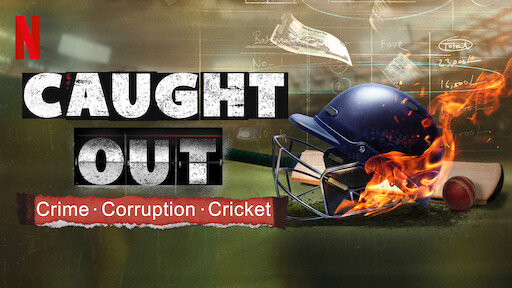You don’t have to know anything about cricket to appreciate Netflix’s Caught Out: Crime. Corruption. Cricket. The title alone is attention-grabbing. If you enjoy documentaries featuring illegal gambling, wiretaps, hidden cameras, bribes, shadowy figures, famous athletes, and famous criminals, this 77-minute film is a must-see.
Cricket, India’s most popular sport, is known as a gentleman’s game. There are strict rules and codes of conduct that must be abided by. Doing anything that violates even the spirit of the regulations is frowned upon. Given that context, you can imagine how apoplectic the entire country was over the match-fixing scandal of the late 1990s and 2000s.
This was the equivalent of the Black Sox, involving some of the biggest names in the game. And like that infamous moment in American history, there remain unanswered questions about who was innocent, who was guilty, and what exactly happened. Caught Out attempts to get as close to the truth as possible.
Gambling is illegal in India, but betting remains common. And whenever there is wagering on live sports, there is always the possibility of fixing— the fear that a player could be seduced or blackmailed into deliberately rigging the outcome. Sometimes it happens through grooming, which can occur over a few weeks or many years.
With plenty of flair from director Supriya Sobti Gupta, Caught Out starts with the journalists who first uncovered the match-fixing scandal. Good journalism starts with asking the right questions. The man who broke the story wasn’t even originally a sports reporter. Aniruddha Bahal says in the documentary that he only wound up covering sports because one of his fellow journalists fell sick. He described himself as an outsider, but that can be an advantage. Sometimes they notice things that veteran reporters miss or have become desensitized to.
Bahal’s aggressive examination of the sport led him to ask questions others should have. After seeing reporters place bets in the press box while covering matches, he decided to dig deeper into the connection between gambling and cricket. His dogged pursuit led him to an explosive 1997 article for Outlook magazine in which cricketer Manoj Prabhakar accused a then-unnamed teammate of approaching him about throwing a match.
The shocking story, with the headline “India’s Worst Kept Secret,” was the talk of the country. Most couldn’t comprehend the possibility that players could be bribed to lose an international cricket match intentionally. As provocative as Prabhakar’s allegation was, an investigation by the cricket board found no evidence of match-fixing. Was that because it was untrue or because no one wanted to know of potential problems? Bahal suspected the latter.
It wasn’t until 2000 when a wiretap in New Delhi caught a conversation between South African cricketer Hansie Cronje and an Indian bookie, that the scandal resurfaced. There was a strong suspicion that matches between South Africa and India were fixed. Cronje, after initially denying the charge, confessed to taking money. And that led Bahal and fellow journalist Minty Tejpal to investigate match-fixing further by collaborating on a documentary called Fallen Heroes: The Betrayal of a Nation. In their film, they used spy cameras hidden in watches and glasses, and briefcases with recording devices. At this point in Caught Out, Gupta adds an Ocean’s 11 touch, complete with a jazzy soundtrack to give the film spark.
What Bahal and Tejpal uncovered led to accusations against other Indian cricketers and administrators. This included Prabhakar revealing the name of the teammate. He said it was beloved superstar Kapil Dev, 1983 World Cup champion and India’s national coach.
That’s when all hell broke loose. (Dev denied the claim).
Ultimately, Caught Out finds a new way to tell a familiar tale about a powerful institution and powerful people. Journalism has limits. It can illuminate a problem but cannot solve systemic issues. It’s up to the authorities to hold those responsible accountable.







